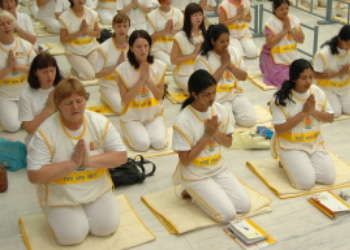Preksha Meditation focuses on perception i.e. to perceive without attachment or aversion, excluding thoughts of the past or imaginations of the future. DuringPreksha , one acknowledges the truth. But after we perceive and realise the truth, we need to contemplate it in Anupreksha.
Contemplation is what occurs after we have engaged in Preksha, or deep and profound perception. In this way,Preksha Meditation is a complete system of spiritual development, involving meditation on both perception andcontemplation . In the first technique ofmeditation , perception is used whereas in the later technique the mind is encouraged to concentrate on the thought process, i.e. contemplation.
In brief, Preksha Meditation is of two types:
- Concentration of perception known as Preksha
- Concentration of thoughts known as Anupreksha

It is stated in theDhyan Shatak that at the end of each meditation session, contemplation must be performed. After meditation, four contemplations are generally practiced:
- Contemplation of solitariness
- Contemplation of transitoriness
- Contemplation oftolerance
- Contemplation of amity
Objectives
Preksha or profound perception is an extremely valuable technique for acquainting oneself with the facts of life. However, in order to change one’s habits, one has to undertake the path of contemplation It is an art of giving suggestions. A person can make suggestions either to his own self; the autosuggestion or he can accept suggestion dictated by someone else. If suggestions are repeated over and over for a long period of time they get registered in our subconscious mind and translated into habits.
The main objectives of contemplation are:
- To change one's character or habit by registering a resolution in the subconscious mind
- Realization of the eternal truth through deep mental concentration
- Emotional transformation or development of virtues
- Eradication of psychological disorders specially phobias
Benefits
Contemplation is a technique by which positive transformation of the negative emotions such as disgust, jealousy, fear, aversion, etc., can be achieved. The other major benefits include:
(a) Physical
- Strengthens the immune system
- Desirable physical changes
- Relieves frombody aches
(b) Psychological
- Replaces negative thoughts with positive ones
- Enhances mental abilities
- Improves imagination power
- Imparts good decision-making power
(c) Emotional
- Radical transformation in the attitude and behaviour
- Rectification of negative instincts with the positive ones
- Attainment of happiness
- Cool temperament
(d) Spiritual
- Inculcates spiritual doctrines in the subconscious mind
- Converts materialistic outlook into the spiritual one
- Realizes the truth
Conclusion
In brief, contemplation can be practiced to change deep-rooted habits and addictions including drinking, smoking, stealing, and lying. Contemplation of any reverse determination that we communicate to our subconscious mind can prove very effective under such situations.